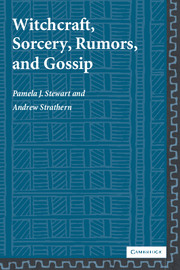3 - Africa
Published online by Cambridge University Press: 20 November 2009
Summary
We have already seen in Chapter 1 how in terms of local-level cases of witchcraft accusations we can find similarities between colonial Africa and historical Europe of the seventeenth century. And in Chapter 2 we mentioned how William Arens had uncovered the theme of African suspicions that Europeans were using their colonial subordinates to obtain the blood of Africans, a notion akin to that of cannibalism. Arens has extensively documented the fantasies of cannibalism imputed to “others” in many historical contexts, including those marked by colonialism. He concludes by comparing what he calls the “man-eating myth” to the fantasy of the witches' sabbath that led, through the imaginings of intellectuals, to witch-hunts in Europe (Arens 1979: 178). (The parallel does not, of course, disprove the existence of cannibalism.)
African ideas about witchcraft mutated from their local-level contexts into ones much more influenced by colonial, and later postcolonial, relations at large, just as, in continental Europe, the idea of linking witchcraft with the Devil was promoted by the authorities of church and state. Presumably, these mutations, representing the impingement of state relations on local levels of society, were already to some degree at work from earlier times, and local-level processes have also continued, intertwined with state relations, as Geschiere's (1997) work particularly shows for Africa. State-based social change was already affecting the cases studied in the 1940s and 1950s by anthropologists such as Max Marwick and Victor Turner.
- Type
- Chapter
- Information
- Witchcraft, Sorcery, Rumors and Gossip , pp. 59 - 95Publisher: Cambridge University PressPrint publication year: 2003

